7 Best Teas To Drink for a Longer Life
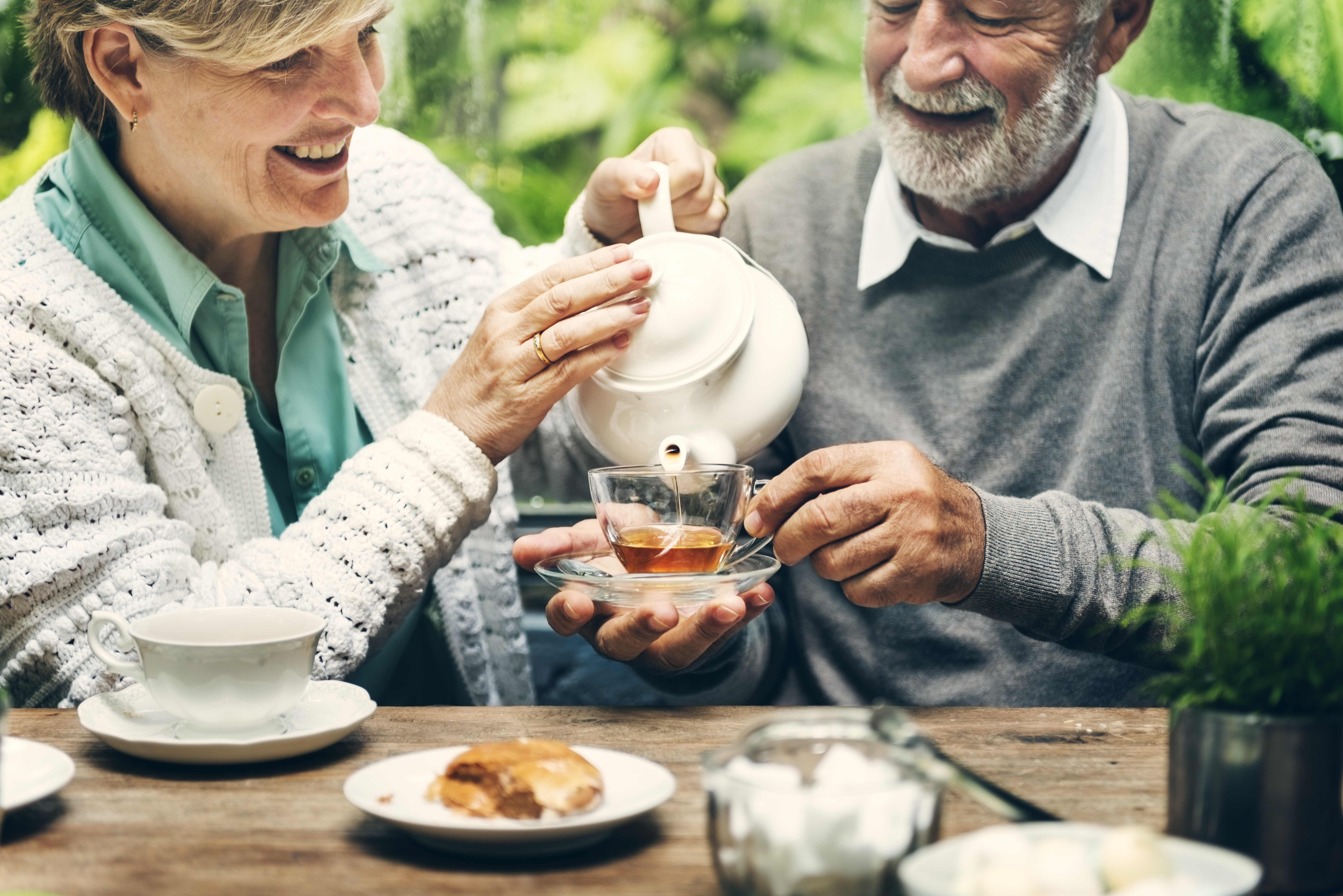
It's safe to assume that we all aspire to live a long life free of medical complications and the physical and mental anguish that accompanies them. Humankind has always maintained an obsession with preserving youth and uncovering the key to immortality. Minimally, any solution we can use to help us elongate our lives and dodge the Grim Reaper for that much longer often brings a sigh of relief in a world where our instinctual yearning for survival often dictates our decisions. While consistently choosing to engage in quality self-care is essential to living a long and healthy life, these choices don't have to be burdensome or complex. In fact, research shows that something as minor as drinking a cup of tea a few times a week can potentially increase your longevity. Given that January is also known as National Tea Month, we wanted to find out more about which teas you should drink for a longer life.
If you're a hardcore coffee purist or an occasional tea drinker, this might be a tough pill to swallow—but you can't deny the data that underscores the health benefits of drinking more tea each day. As one study published in the European Journal of Preventive Cardiology observed, "Habitual tea drinkers had 1.41 years longer of atherosclerotic cardiovascular disease-free years and 1.26 years longer of life expectancy at the [sic] age of 50 years. […] Tea consumption was associated with reduced risks of atherosclerotic cardiovascular disease and all-cause mortality, especially among those consistent habitual tea drinkers."
What types of tea may help you live longer?
According to Lauren Manaker, MS, RDN, LD, CLEC, author of the First Time Mom's Pregnancy Cookbook, the 7 Ingredient Healthy Pregnancy Cookbook, and Fueling Male Fertility, some of the best teas you can drink for a longer life are known as "true teas."
"True teas include green, oolong, black, and white. They contain hundreds, if not thousands, of bioactive compounds, including amino acids, caffeine, lignins, proteins, xanthines, and flavonoids—all components that may be linked to positive health effects," explains Manaker.
"Most recently, the Academy of Nutrition and Dietetics (AND) released new clinical guidelines on the recommended amounts of flavan-3-ols, a plant compound found in large quantities in true tea," she continues. "Consumption of flavan-3-ols is linked to improved blood pressure, cholesterol levels, and blood sugar. Some research has also shown that flavan-3-ols helps prevent diabetes and heart disease when intake is between 400–600 mg per day, which can be achieved by drinking two cups of green or black tea every day."
While drinking true teas can help increase your chances of living a longer life, some varieties of herbal tea have also been known to have medicinal effects that promote health, and as such, have been linked to longevity, too. Research suggests that polyphenols—a type of plant compound known for its numerous health benefits—contained in many herbal teas reportedly possess antioxidant, anti-inflammatory, and anti-viral properties. This is great news considering that "diseases caused by viruses remain among the leading causes of morbidity and mortality, in both developed and developing countries," according to a report on the possible role polyphenols can play in fending off viral infections published in Science of the Total Environment.
Whether you prefer to take the true tea route or would rather opt for herbal refreshments, here are seven of the best teas you can drink to increase your odds of living a long, healthy life. But if you're still brewing with curiosity over which tea may help support your energy levels and cognition, be sure to also check out Yerba Mate Tea May Help You Focus Better Than Coffee—Here's Why.
Oolong tea
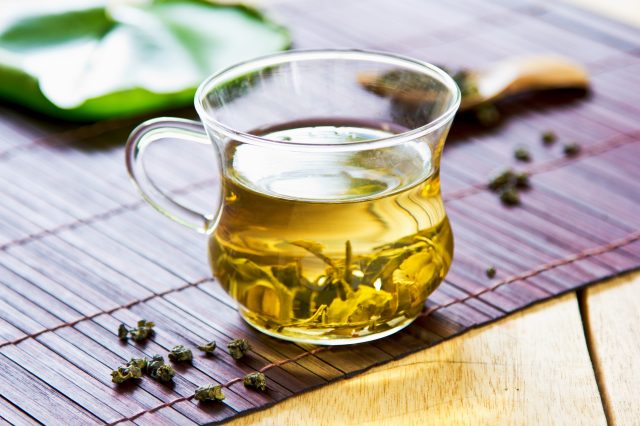
"Oolong tea is a popular tea enjoyed in China, and it is made from the same tea leaves as black and green," says Manaker. "Like all true teas, oolong contains a compound referred to as EGCG, which may have anti-cancer properties."
"In one study that compared tea-drinking habits among patients with ovarian cancer versus controls, the results showed that those who did not develop ovarian cancer appeared to drink more green and/or oolong tea [compared to] those who did develop this cancer. According to this data, habitual tea drinking was associated with a 71% reduced risk for ovarian cancer," says Manaker.
Although drinking oolong tea might be connected to reducing the risk for certain cancers, she also notes that "more data is needed to confirm this."
"It is important to keep in mind that developing ovarian cancer can be a result of many factors, not just drinking tea," she advises.
You don't have to travel far or break the bank to enjoy a cup of oolong tea. In fact, Twining of London carries 100% Pure Oolong Tea, which we consider to be one of the 12 Healthiest Teas on Grocery Store Shelves.
Turmeric tea
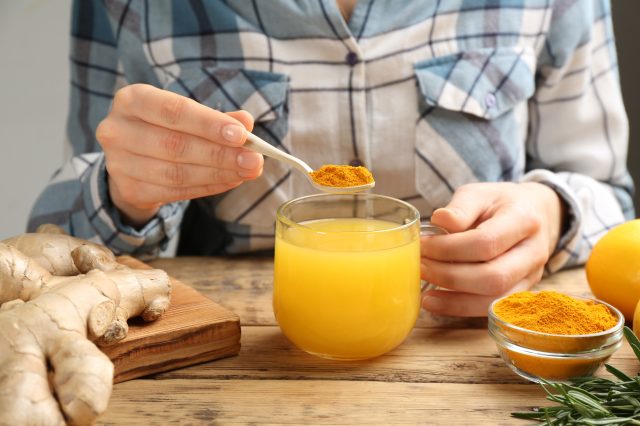
"Turmeric is a popular addition to many dishes, and people are starting to turn to it for its potential health benefits as well as for its unique taste," says Manaker.
Manaker attributes turmeric's health benefits and potential ability to support to longevity, in part, to a type of polyphenol this spice contains called curcumin, which one study claims is among "the most promising bioactive natural compounds," particularly in terms of its potential to treat several varieties of cancer.
"Some data suggests that curcumin may have anti-cancer properties," she adds.
Green tea
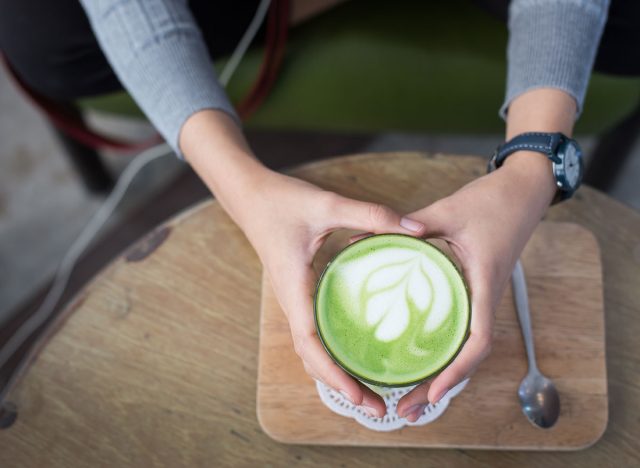
"A large population study focused on Japanese men and women showed that those who drank just over two cups of green tea per day had a reduced risk of death from cardiovascular disease by 22–33% versus those who drank less than a half-cup (3.5 ounces) of green tea daily," says Manaker.
From helping reduce your cancer risk to supporting your brain function and even improving skin elasticity to stop sagging and preserve a youthful glow, green tea may as well be rebranded as a "Benjamin Button elixir." As one 2021 Molecules study notes, "The Japanese powdered green tea, matcha, contains high amounts of substances with antioxidant and anti-inflammatory effects. It has promising potential health benefits, mainly through a high concentration of catechins."
Matcha, in particular, is a type of green tea that can help optimize your health in ways to possibly elongate your life, while also providing an extra boost of energy comparable to coffee. Best of all, some brands of matcha, like the Beauty Matcha Latte powder from Kroma Wellness, include other ingredients that may help support your longevity, too. For instance, this particular matcha formulation from Kroma Wellness also contains turmeric as well as ginger, and studies show these ingredients have also been linked to healthy aging.
White tea
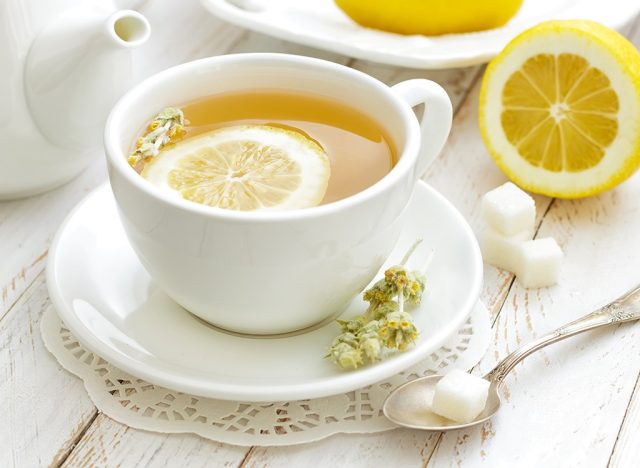
"While not as popular as the other true teas, white tea can be a source of many important compounds that may support our overall health, like EGCG," Manaker explains. "White teas may contain higher concentrations of catechins than other teas, like EGCG. Also, it has antioxidant and antiproliferative effects against cancer cells."
Black tea
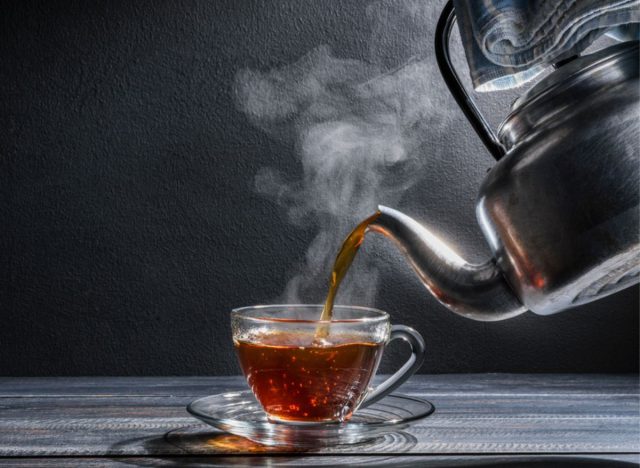
A classic type of tea, black teas can help you live a longer life by supporting heart health and mitigating potential cardiovascular issues.
"Data shows that people who regularly consume three or more cups of black tea per day have a reduced risk of heart disease and stroke," says Manaker.
Published in Annals of Internal Medicine, this study found that those who drank over three cups of black tea each day had 9–13% overall lower risk of death compared to those who were not tea drinkers.
Hibiscus tea
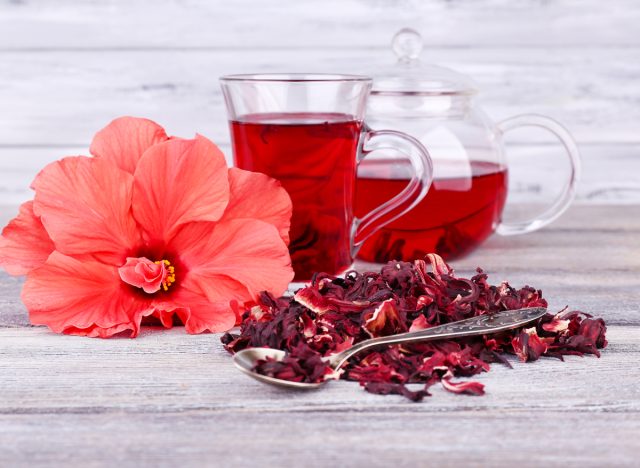
Hibiscus tea exemplifies a kind of herbal tea that may up your chances of living a longer life.
"While hibiscus tea doesn't contain the same plant compounds as true teas, it may offer unique benefits thanks to its own natural compounds," says Manaker. "Some data shows that drinking this tea every day may help reduce blood pressure—which may, in turn, help people live healthier lives."
For instance, the results of a randomized controlled trial published in the Journal of Nutrition on the effects of hibiscus tea on prehypertensive and mild hypertensive participants "indicated that the hibiscus tea treatment was responsible for the BP-lowering effect regardless of age, gender, or dietary supplement use."
Hibiscus tea is also said to have some antiviral effects and can even help manage cholesterol by lowering LDL (the "bad" cholesterol) and triglyceride levels.
Chamomile tea
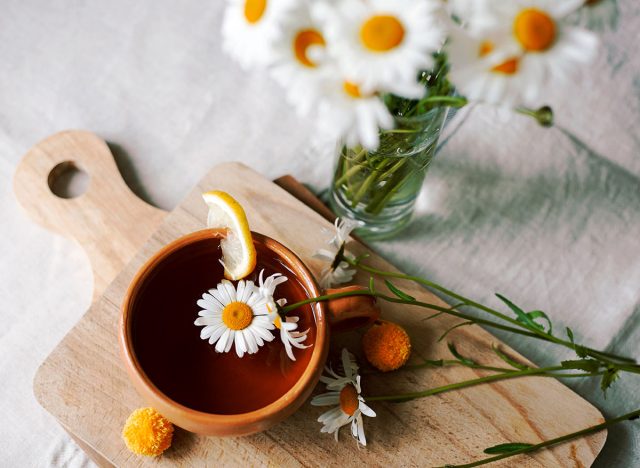
Another herbal tea that's been scientifically linked to longevity is chamomile tea. For instance, when researchers from the University of Texas Medical Branch at Galveston conducted a study on the effects of drinking chamomile in Mexican-American women over age 65, they found that drinking this type of tea was "associated with a 29% decreased risk of from all causes among women compared with nonusers, even after adjusting for demographics, health conditions[,] and health behaviors," according to ScienceDaily.
Chamomile tea has also been linked to slowing age-related bone loss, a lower risk of heart disease-related mortality, immune system health, and may even potentially protect against certain cancers.
- Source: https://www.sciencedaily.com/releases/2020/01/200109105508.htm
- Source: https://www.census.gov/newsroom/stories/hot-tea-month.html#:~:text=National%20Hot%20Tea%20Month%3A%20January%202023
- Source: https://academic.oup.com/advances/article/13/6/2070/6747118?login=false
- Source: https://www.ncbi.nlm.nih.gov/books/NBK92768/
- Source: https://www.sciencedirect.com/science/article/pii/S004896972104794X?via%3Dihub
- Source: https://www.ncbi.nlm.nih.gov/pmc/articles/PMC6835707/
- Source: https://www.ncbi.nlm.nih.gov/pmc/articles/PMC9110206/
- Source: https://academic.oup.com/jn/article/138/8/1543S/4750814
- Source: https://pubmed.ncbi.nlm.nih.gov/25236244/
- Source: https://www.acpjournals.org/doi/10.7326/M22-0041
- Source: https://pubmed.ncbi.nlm.nih.gov/23295000/
- Source: https://www.ncbi.nlm.nih.gov/pmc/articles/PMC5059367/
- Source: https://www.ncbi.nlm.nih.gov/pmc/articles/PMC3593772/
- Source: https://pubmed.ncbi.nlm.nih.gov/15537303/
- Source: https://www.ncbi.nlm.nih.gov/pmc/articles/PMC2995283/
- Source: https://bmcresnotes.biomedcentral.com/articles/10.1186/s13104-018-3960-y#:~:text=Our%20extract%20contained%20high%20polyphenols,less%20than%20ours%20%5B33%5D







